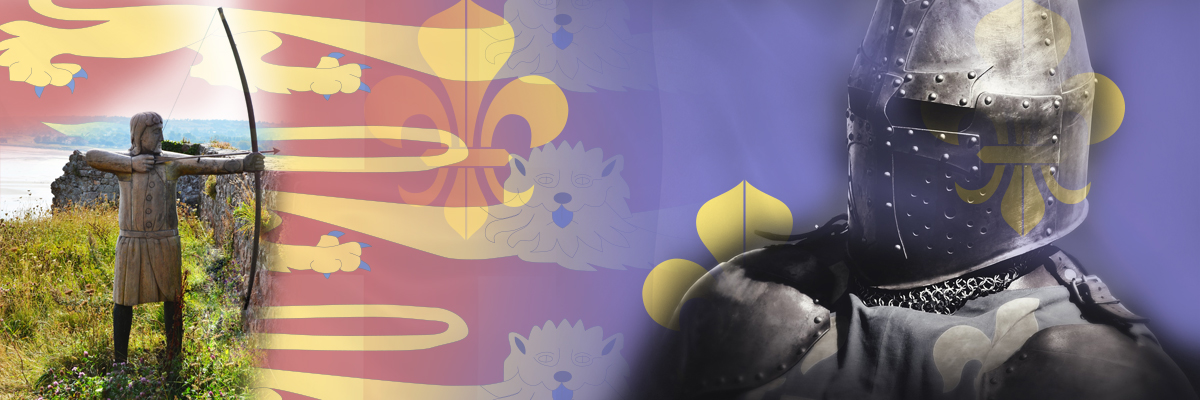The Battle of Agincourt was one of the most famous battles of what would later come to be known as the Hundred Years’ War. The Hundred Years’ War refers to a series of smaller wars and conflicts between England and France that took place over the course of roughly a century during the late medieval period (starting in the 14th century and ending in the 15th.) It wasn’t all war and bloodshed duirng this time, as there were also intermittent periods of peace, but The Hundred Years’ Period Of Wars, Battles, Treaties, And Low Level Skirmishes just doesn’t have the same ring to it.
Agincourt is so well known because it ended in a resounding Engilsh victory that was anything but expected. The English were actually retreating from France when their retreat was blocked by a numerically superior and extremely well equipped French army. The English army, led by King Henry V himself, was made up mostly of lightly equipped archers armed with the famous English longbow, while the French army was made up of lots of heavily armored mounted knights and men-at-arms. The resulting battle, and the outsized role the English archers (longbowmen) played in the outcome gave the whole thing a very “David Vs. Goliath” vibe, which I think helped cement its place in history and popular culture. The fact that the win was a huge morale boost for the English and basically neutered the French militarily for decades to come probably didn’t hurt, either.
In the popular telling of the tale of the battle, the English longbowmen rained arrows down upon the French, absolutely shredding them, and causing massive casualties. Sure, the longbow had already been a staple in the English military for decades at this point, but the arrogant French, probbably confident in their overwhelming numbers somehow got caught with their pants down and had absolutely no answer for this devastating weapon. Really makes you wonder how they ever managed to win a single battle up to that point.
Yeah, about that. The French knights and men-at-arms wore the latest and greatest in steel plate armor, rendering longbows as a weapon pretty much moot. As a matter of fact, steel plate armor had become so affordable and commonplace by this time that pretty much anyone who wasn’t a piss poor peasant could afford it. So if you asked them about longbows, they would just shrugh their shoulders “Eh.” However, if you asked them about longbowMEN, that would have elicited a much different and much more spirited response.
The battle of Agincourt took place on a narrow strip of land hemmed in by woods. This made it difficult for the French to properly deploy their superior numbers. To make matters worse, the ground was freshly plowed, and in the days leading pu to the battle, it rained like a mother fucker. As a result of all this, on the day fo the battle, the ground was soggy and muddy as hell. This made it very difficult (and exhausting) for the very heavy French knights to move around and attack the English. The problem was compounded by the French troops’ numbers, as their infantry was very tightly packed in a very small amount of space. Add to that the muddy ground getting churned up by a failed cavalry charge and the subsequent retreat, and you’ve got a recipe for disaster.
The lightly equipped Englihs archers had no such problems. While the longbows were pretty much useless against the French knights’ armor, they were very much effective against their horses. Plus, you shoot enough arrows at a group of tightly packed knights and men-at-arms, a few are bound to find a gap in the armor and hit something. All this led to the very heavy French infantry falling down a lot and getting stuck in the mud, uanble to get up. Many drowned in the mud or were crushed and/or asphyxiated by the weight of other bodies falling on top of them. The lihgtly equipped English archers, on the other hand, were able to literally stroll right up to a downed knight and either use daggers, war hammers, or pole arms and kill them as they lay there helplessly. It was an absolute slaughter.
The English longbows may not have actually actually killed very many French soldiers at Agincourt, but the English longbowMEN had an absolute field day.
